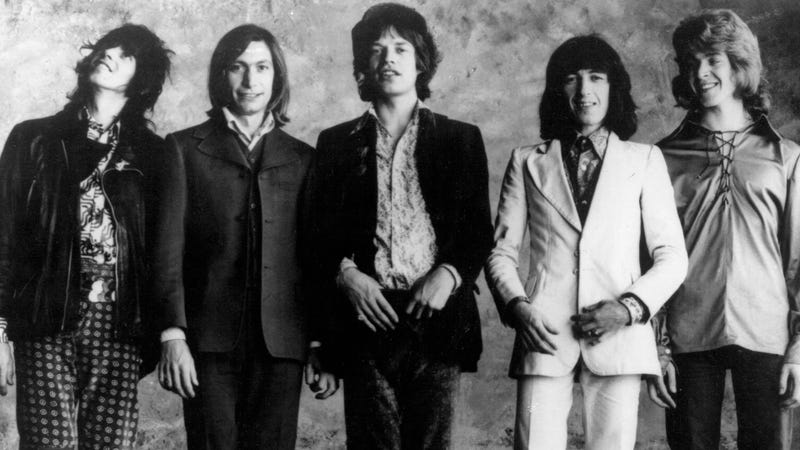
The Run That Back series is a deep dive into some of music’s most popular or underrated projects. Whether it’s been 5 years or 50, there’s never a wrong time to run that back.
Listen to your favorite music now -- curated for fans, by fans -- on Audacy’s The Rolling Stones Radio, and more!

Today is a very special day in Rock and Roll history. On this day in 1972, The Rolling Stones released their 12th studio album Exile on Main St. The album is considered by many to be The Stones’ magnum opus and overall one of the greatest albums of all time.
When asked which Rolling Stones album was his favorite, the band’s beloved guitarist Keith Richards responded, “Ah, Exile. Definitely Exile.”
This extraordinary piece of art arrived after a period of time when The Stones were quite literally exiled from England. Even though they were one of the most popular bands in the world at the time, the band was not able to fully profit from their own recordings. In the 2010 documentary “Stones in Exile,” Mick Jagger recounted, “we’d been working hard, we were a very, very successful band. We’d sold a lot of records but we weren’t getting paid for it, because the record contracts were giving us such a low royalty. What we found out was that we had a management company guy who claimed that he owned everything that we were doing in the past and always would in the future. Touring, records, publishing songs, everything you could name. He said he owned it. So we had to get rid of him and try to get out of this ridiculous Byzantine mess that [we had] created for [ourselves].”
On top of not entirely profiting from their musical recordings, The Stones were living a lavish lifestyle that further drained their wallets. The bassist of the group, Bill Wyman, said in the documentary, “we were supposed to live this life. Limousines you had to have… And the money just flew, so [we] were always in debt. None of us had paid tax. We thought we had. We thought that had been dealt with, and it hadn’t. Tax, under the Labour government of Wilson, was 93%. If you earned 1,000000 quid, which we didn’t, you’d end up with 70 grand. So it was impossible to earn enough money to pay back the Inland Revenue and stay here in England.”
To avoid paying taxes, the band ultimately fled their homeland in 1971 and took to the French Riviera where Richards had conveniently leased the gorgeous Nellcôte mansion. Prior to their exile, the band had begun recording new music in England and continued recording the album in the basement of the 16-room French mansion. With guests like saxophonist Bobby Keys and producer Jimmy Miller, as well as Mick Jagger’s new bride Bianca Pérez-Mora Macías and Keith Richards’ girlfriend Anita Pallenberg, the band essentially turned the Nellcôte mansion into a musical playground and filled their days with sex, drugs, and Rock and Roll.
The music in the album reflects the free-spirited energy of which it was recorded. One of the album’s singles, “Happy,” was famously recorded when Keith Richards happened to wake up before the rest of the band. As Richards told it, ‘“Happy” was something I did because I was for one time early for a session. There was Bobby Keys and Jimmy Miller. We had nothing to do and had suddenly picked up the guitar and played this riff. So we cut it and it’s the record, it’s the same. We cut the original track with a baritone sax, a guitar and Jimmy Miller on drums. And the rest of it is built up over that track. It was just an afternoon jam that everybody said, ‘Wow, yeah, work on it.’” The song ended up debuting at number 69 on the Billboard Hot 100 in the summer of 1972 and is the band’s only charting single to feature Richards on lead vocals.
The party-spirit that the band embodied during the making of the album is encapsulated on the leading single off of the album, “Tumbling Dice.” The song’s lyrics were inspired by a conversation Mick Jagger had with the housekeeper at Nellcôte. In the book, ”Rocks Off: 50 Tracks That Tell the Story of The Rolling Stones,” Mick Jagger recalled, “I sat down with the housekeeper and talked to her about gambling. She liked to play dice and I really didn’t know much about it, but I got it off her and managed to make the song out of that. (It) was written to fit Keith’s riff. It’s about gambling and love, an old blues trick.”
The band heavily incorporated rhythms and lyrical styles derived from the Blues to express their anger stirred by their ostracism from England. In the upbeat boogie song, “Rip This Joint” off of the album, Mick Jagger laments the band’s exile, singing “Mister President, Mister Immigration Man, let me in, sweetie, to your fair land.” When it came to designing the artwork for the album, Jagger said he wanted cover art that portrayed The Stones as, “runaway outlaws using the blues as its weapon against the world…[showcasing a] feeling of joyful isolation, grinning in the face of a scary and unknown future.”
While much of the album is defined by an upbeat Blues and Rock sound, The Stones also found success with their Country classic, “Sweet Virginia.” This stripped-back, acoustic song features harmonica-playing from Jagger and a classic country shuffle-rhythm from the late and great drummer Charlie Watts. The song has soft but powerful lyrics, with the chorus ringing, “But come on, come on down, Sweet Virginia, Come on, honey child, I beg of you, Come on, come on down, you've got it in ya, Got to scrape that s*** right off your shoes.” The song continues to have a powerful grip on pop culture and has appeared in Rian Johnson’s 2019 film, Knives Out as well as Martin Scorcese's 1995 film, Casino.
Filled with other hits like “Rocks Off,” “Shake Your Hips,” and “Shine a Light,” this timeless album is worthy of your listening. Join us in celebrating this hedonistic album by tuning into Audacy's The Rolling Stones Radio!
Browse even more of Audacy's all-new stations like 80s Guitar, Rock N’ Road, Freedom Rock, The Canyon, Arena Rock, Wake Up and Rock, and The Roots of Rock for those who crave the early days.
LISTEN on the Audacy App
Sign Up and Follow Audacy
Facebook | Twitter | Instagram
